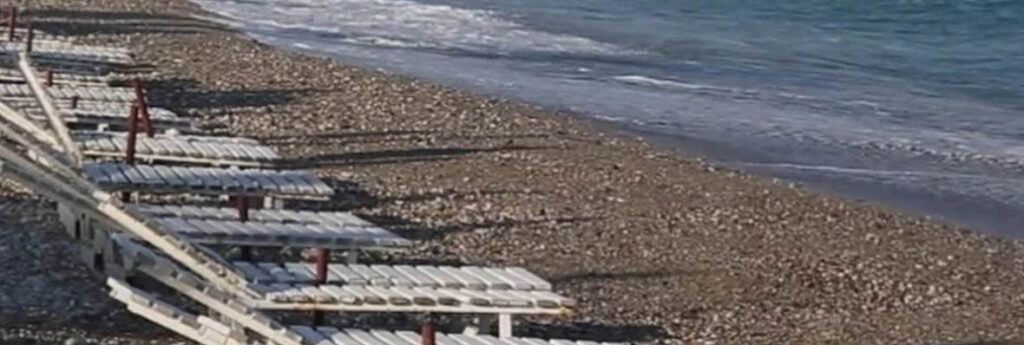After losing two years to the COVID-19 pandemic, shopkeepers in the heart of the Turkish Riviera had hoped for a strong tourism season this year to help keep their businesses afloat. But Russia’s war in Ukraine is fast dampening their spirits.
“We’re trying to earn our bread through tourism, but it looks like the war has finished off this (tourism) season, too,” Devrim Akcay said outside his clothing shop in the resort town of Belek, along the Mediterranean coast’s Antalya province.
Nowhere is the threat of just one ripple effect of the war – lost tourism – felt more strongly than in Antalya, a region dotted with shimmering beaches and archeological sites where visitors from Russia and Ukraine, along with Germany, make up the top contributors to tourism revenue.
Countries from Turkey to Thailand, Egypt and Cuba are bracing for the loss of Russian and Ukrainian visitors just as their travel sectors were looking to rebound from the pandemic. With many tourist-dependent economies also struggling with surging inflation and other woes, hotel workers, guides and others who serve visitors from the two warring nations expect more pain.
The turquoise waters and white sand beaches of the Cuban resort of Varadero, which until recently received a significant number of tourists – mainly Russians – are now almost empty.
Russians accounted for almost a third of Cuba’s visitors last year – more than 146,000 – and some saw them as the way to get some oxygen to an industry ailing from the pandemic and tighter sanctions imposed by Donald Trump.
“Now, we also have to get by without the Russian tourism,” said Jose Luis Perello Cabrera, a Cuban economist and tourism expert.
The Association of Tour Operators of Russia estimated that between 6,000 and 8,000 Russian tourists were on the island when the war in Ukraine broke out. Several flights left from Varadero in early March to bring them home.
“Losing that market is a strong blow to Cuba,” said Natasha Strelkova, Russian-Cuban tour operator and guide on the island.
Across the Atlantic, Russians and Ukrainians can represent up to 35% of Egypt’s tourists annually, said Hisham el-Demiry, former head of the government-run Tourism Development Authority.
He worries the economic crisis brought on by the war could mean fewer guests overall.
“It’s a huge impact, a domino effect. … The war has changed people’s priorities, and tourism, which is a very sensitive industry, will be the first victim,” he said.
Rania Ali, a reception manager at a four-star hotel in Hurghada, said they “were over 75% occupied early before the war, now we are just 35%.”
Russians were just among the top 10 groups of visitors to Thailand until late last year, when the country began to reopen to international tourists. Russia restarted charter flights relatively early and in winter, when Thailand’s balmy temperatures make it a highly desirable destination, helping its people become the top visitors among the modest numbers that Thailand started welcoming back.
The November-to-March season when Russians usually visit is drawing to an end, and the plunge in the ruble’s value makes travel to Thailand and anywhere else far more costly now, said Chattan Kunjira Na Ayudhya, deputy governor for International Marketing for the Tourism Authority of Thailand.
“This probably will lead Russian tourists to shift to destinations that offer them all-inclusive packages with better prices,” he said.
In Turkey, officials had hoped that with pandemic restrictions easing, tourism could replicate or exceed the numbers from 2019, when some 52 million visitors – including about 7 million Russians and 1.6 million Ukrainians – brought US $34 billion in revenue. The overall number of visitors dropped to $15 million in 2020 but recovered to around $29 million last year.
President Recep Tayyip Erdogan had strategized that opening up the economy and delivering big growth this year could help him get re-elected next year, experts say. It’s a tall order for a country with a currency crisis and inflation exceeding 54%, making it difficult for consumers to purchase even basic goods.
“For that to happen, Turkey needs to have its robust tourism and trade ties with Russia unhindered,” said Soner Cagaptay, a Turkey analyst at the Washington Institute for Near East Policy.
The expectation before the war was “maybe 10, 15 million Russians would be visiting Turkey this summer that will be spending 10 billion dollars, a shot in the arm for Turkey’s ailing economy,” Cagaptay said.
Now, business groups say they’re seeing erosion in trade both ways, including a fall in demand for Turkish produce because Russian buyers are struggling to make payments. That’s despite Turkey not joining in sanctions against Moscow.
NATO-member Turkey, which has cultivated close ties with both Russia and Ukraine, is trying to balance those relations and has positioned itself as a neutral party trying to mediate. Turkey has criticized Russia’s military actions in Ukraine as “unacceptable” but also said it would not give up on either side.
The Antalya region is haunted by the memory of 2016, when Russia inflicted a serious blow to Turkey’s economy by barring the import of some agricultural produce and stopping charter flights there after the Turkish military shot down a Russian fighter plane in 2015.
Agriculture has already started to suffer from the effects of the war, said Davut Cetin, head of the Antalya Chamber of Commerce and Industry.
“The Ukrainian market has been shut down. No fresh fruit or vegetable is leaving for Ukraine now,” Cetin said.

